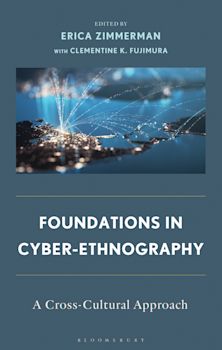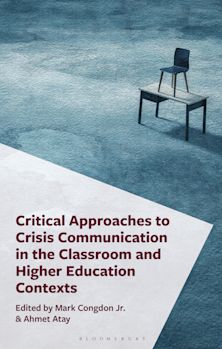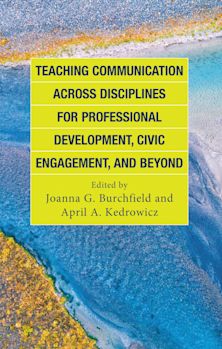- Home
- ACADEMIC
- Communication Studies
- Theory, Research, and Teaching Methods – Communication
- Millennial Culture and Communication Pedagogies
Millennial Culture and Communication Pedagogies
Narratives from the Classroom and Higher Education
Andrew Sutherland (Author) , Michael G. Strawser (Author) , Ahmet Atay (Anthology Editor) , Mary Z. Ashlock (Anthology Editor) , Ahmet Atay (Contributor) , Mary Z. Ashlock (Contributor) , Raymond Blanton (Contributor) , Anne B. Bucalos (Contributor) , Jennifer J. Calvert (Contributor) , Rod Carveth (Contributor) , Yea-Wen Chen (Contributor) , Mark J. Congdon Jr. (Contributor) , Laura Dorsey-Elson (Contributor) , Craig L. Engstrom (Contributor) , Anthony Esposito (Contributor) , Kathryn T. Garlitz (Contributor) , Liliana (Lily) Herakova (Contributor) , Spoma Jovanovic (Contributor) , David H. Kahl Jr. (Contributor) , Baruti Kopano (Contributor) , Stephen M. Kromka (Contributor) , Brandi Lawless (Contributor) , Phyllis McCluskey-Titus (Contributor) , L. Adam Mekler (Contributor) , Marjorie A. Miller (Contributor) , Scott A. Myers (Contributor) , Andrew L. Nicholson (Contributor) , Elizabeth A. Petre (Contributor) , James T. Petre (Contributor) , Ronald Raymond (Contributor) , Michelle Rodems (Contributor) , Vincent Russell (Contributor) , Matthew J. Thomas (Contributor) , A. J. Verdelle (Contributor) , Diane Waryold (Contributor)
Millennial Culture and Communication Pedagogies
Narratives from the Classroom and Higher Education
Andrew Sutherland (Author) , Michael G. Strawser (Author) , Ahmet Atay (Anthology Editor) , Mary Z. Ashlock (Anthology Editor) , Ahmet Atay (Contributor) , Mary Z. Ashlock (Contributor) , Raymond Blanton (Contributor) , Anne B. Bucalos (Contributor) , Jennifer J. Calvert (Contributor) , Rod Carveth (Contributor) , Yea-Wen Chen (Contributor) , Mark J. Congdon Jr. (Contributor) , Laura Dorsey-Elson (Contributor) , Craig L. Engstrom (Contributor) , Anthony Esposito (Contributor) , Kathryn T. Garlitz (Contributor) , Liliana (Lily) Herakova (Contributor) , Spoma Jovanovic (Contributor) , David H. Kahl Jr. (Contributor) , Baruti Kopano (Contributor) , Stephen M. Kromka (Contributor) , Brandi Lawless (Contributor) , Phyllis McCluskey-Titus (Contributor) , L. Adam Mekler (Contributor) , Marjorie A. Miller (Contributor) , Scott A. Myers (Contributor) , Andrew L. Nicholson (Contributor) , Elizabeth A. Petre (Contributor) , James T. Petre (Contributor) , Ronald Raymond (Contributor) , Michelle Rodems (Contributor) , Vincent Russell (Contributor) , Matthew J. Thomas (Contributor) , A. J. Verdelle (Contributor) , Diane Waryold (Contributor)
This product is usually dispatched within 1 week
- Delivery and returns info
-
Free US delivery on orders $35 or over
You must sign in to add this item to your wishlist. Please sign in or create an account
Description
This book examines the ways in which faculty and staff at the higher education level teach and communicate with their millennial students and colleagues. The contributors address how millennials' academic and non-academic interests and everyday performances within and outside of higher education influence how faculty and staff communicate with them. This book delves into how millennials can become more adaptable in their communication with others in society especially in higher education, be it from different generations, or cultures that may or may not communicate the way they do. The contributors argue that millennial culture should be carefully studied by instructors, researchers, and administrators to create a better classroom and educational experience and also improve the level of communication among these constituencies.
Table of Contents
Section 1: Theorizing Pedagogies of Millennial Generation
Chapter 1: Resisting the Influence of Neoliberalism on Millennial Faculty through Critical Communication Pedagogy and Critical Mentoring
Chapter 2: Let Your Self in: Mentoring from/on the Margins of Academia in the Millennial Context
Chapter 3: Academic Allies and Millennial Voices for Democratic Practice
Chapter 4: Millennial Culture and Communication Pedagogies: Mentoring Millennial Faculty for Success
Chapter 5: Communication with Millennials: Developing a Critical Consciousness and Pedagogy
Chapter 6: “An Eye Is an Eye Makes the World Colorblind”: Teaching Millennials How to Get W.O.K.E.
Chapter 7: Diversity in Millennial Generation: Diversifying Pedagogical Approaches
Section 2: Millennial Generation and Pedagogies in Action
Chapter 8: Using Rhetorical/Relational Goal Theory to Examine Millennial Students’ Academic and Relational Needs
Chapter 9: A Rhetorical Approach to Teaching and Mentoring Millennials in the Classroom
Chapter 10: Using Client Projects to Enhance Millennial Students’ Problem-Solving Skills
Chapter 11: Technology Consumption: Implications for Teaching and Learning
Chapter 12: Beyond Distraction: Using Technology to Support Communication Skills Development for Urban-Educated Millennials
Chapter 13: Digital Natives: Teaching Both Mediated and Face to Face Communication Skills in the College Classroom
Chapter 14: Small Talk is Big Talk: Guiding Millennial College Students to the Richest Form of Communication
Index
About the Editors
About the Contributors
Product details
| Published | Nov 15 2018 |
|---|---|
| Format | Hardback |
| Edition | 1st |
| Extent | 286 |
| ISBN | 9781498550642 |
| Imprint | Lexington Books |
| Illustrations | 7 b/w photos |
| Dimensions | 9 x 6 inches |
| Publisher | Bloomsbury Publishing |
About the contributors
Reviews
-
Building from the premise that the Millennial Generation has experienced unprecedented global change, the essays in Millennial Generation and Pedagogy brilliantly complicate our understandings of this population of students, some of whom are now emerging faculty. Authors write from their personal experience of being a Millennial or having taught Millennial students. Anyone who has a stake in developing an intersectional approach to teaching and mentoring must read this book.
Alberto González, Bowling Green State University
-
This is an insightful and useful collection of essays that productively engage and apply communication theory to better understand and engage millennials--as students and as colleagues. When it is so easy to shore up stereotypes about this generation, these scholars take millennials seriously as meaningful participants in teaching and learning, as people constituted in enduring and complex cultural relationships who are capable of agency and action. Readers who are researchers will find avenues for continued and increasingly nuanced investigation; readers who are teachers will find paths forward in mutual understanding and dialogue; and readers who are students will find themselves better prepared to engage in conversations about (and resist mischaracterizations of) who they are and can become in the world.
Deanna L. Fassett, San José State University



































